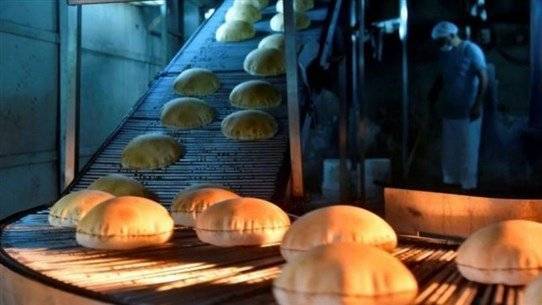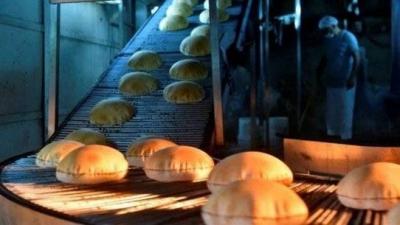Is a bread crisis nearing in Lebanon, starting from the Bekaa region? Yesterday morning, several bakery owners in Bekaa gathered in a protest in front of the Bekaa Mill, raising concerns about the decline in flour quantities necessary to ensure the continuation of production in their bakeries. The mill has stopped supplying flour to them for several days due to depletion of wheat supplies. The Bekaa Mill is one of two mills that supply bakeries in the Bekaa region, and it is considered the primary supplier, with its production purchased by 29 bakeries that rely on it for about 80% of their flour needs. These bakeries have not been able to obtain the required quantities for several days.
According to the protesters, some bakeries have only enough stock for one or two days of bread production, while others are completely out of flour. They have requested the Ministry of Economy to dispatch teams to bakeries to verify the situation and assess the flour quantities available at all of them. The issue, as confirmed by the protesters, is not exclusive to Bekaa; it is particularly severe there due to the depletion of stocks at its largest mill. Notably, there is only one other mill in the region, the Sunbula Mill, but its production capacity, as indicated by the protesters, does not exceed 80 tons per day. Meanwhile, the daily flour requirement for the Bekaa, according to the head of the Bakery Owners Union in Bekaa, Abbas Haidar, is about 600 tons. The total monthly wheat requirement for Lebanon is around 27,000 tons, of which approximately 12,000 tons are needed for the Bekaa.
These quantities were previously supplied by the Bekaa Mill until it announced a halt in operations days ago. The repercussions of this stoppage have begun to impact bakery stocks. It has become apparent that this problem extends to a larger crisis, especially since the Bekaa Mill purchases wheat from the Baqalyaan Mill, which has also halted wheat deliveries to mills. This indicates that the crisis will not be limited to the Bekaa but will spread to other Lebanese regions as their stocks diminish. Currently, according to Haidar, importing new wheat quantities takes at least a month until approvals are granted by the Ministry of Economy, and the Banque du Liban agrees to sign off on the transfers.
The secretary of the Bakery Owners Union in Lebanon, Nasser Sarour, explained that there are two main wheat importers in Lebanon: the Baqalyaan Mill and the Taj Mill, which supply wheat to 15 mills across Lebanon. It has become clear from the protesters' comments that the former has stopped importing wheat, while the total output of the latter does not exceed 600 tons daily.
The protesters emphasized that they are not defending their bakeries but rather fighting for the citizens' right to bread. They asserted that they do not want to confront the citizens, placing the blame for the wheat crisis on the Ministry of Economy, which has reassured the public for months about working to secure Lebanon's food safety supply. Sarour expressed that Lebanon is already facing multiple issues and that they will not accept depriving people of bread. Furthermore, they will not allow bakeries to become scapegoats for the supply crisis, as bakeries do not restrict bread access. The responsibility lies with those who assured the public that there were sufficient quantities for six months and promised to flood the country with wheat and flour from India and America but failed to follow through.
They called for an urgent emergency plan to import flour for three weeks to prevent a bread shortage, emphasizing the need to begin supplying wheat to Bekaa starting today (Tuesday). They pointed out that communication has been established with the Ministry of Economy to transfer any surplus quantities from any mill to Bekaa while a long-term solution is sought.
Otherwise, the protesters warned that any delay in addressing this issue could result in significant unrest in the country, especially since the scarcity of bread in bakeries will lead to price hikes and cause major problems and chaos.




